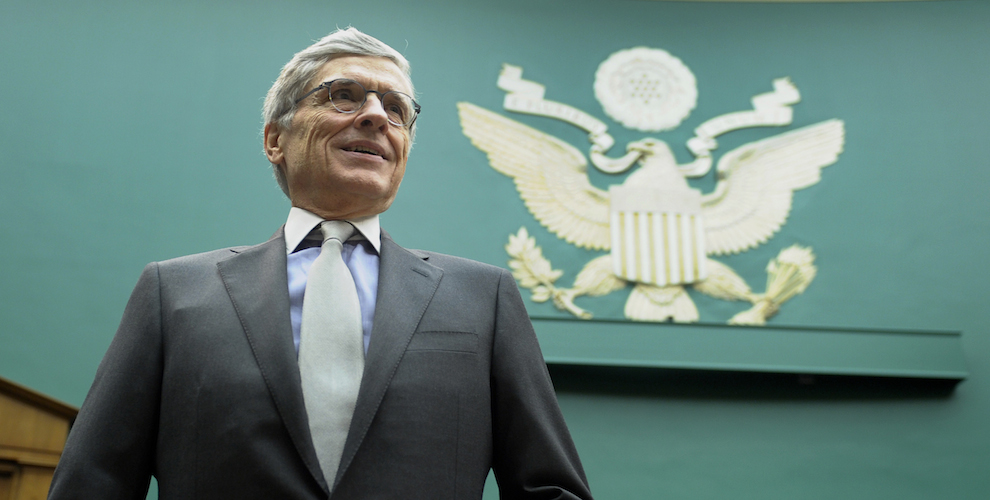
This week’s essential reads: The three key reads this week are Stanford professor Barbara van Schewick on net neutrality and innovation, Indiana professors Lars Willnat and David Weaver’s findings from their survey of American journalists, and The New York Times’ David Segal on unwatched online video ads.
Will new FCC regulations harm startups?: The U.S. Federal Communications Commission’s proposed Internet regulations, which are set to be formally presented next week, are coming under fire from all corners, led by commissioners of the FCC itself. Commissioner Jessica Rosenworcel called for FCC chair Tom Wheeler to postpone the presentation of the regulations because of the “torrent” of criticism they’ve prompted, a suggestion Wheeler promptly rejected. Another commissioner, Mignon Clyburn, reiterated her opposition to the sort of Internet “fast lanes” Wheeler is proposing, urging the FCC to revisit its approach to Internet regulation.
Meanwhile, more than 100 Internet companies, including giants like Google, Facebook, Twitter, Amazon, and Microsoft, sent a letter to the FCC expressing their concerns about the proposed regulations, calling them “a grave threat to the Internet.” Recode’s Amy Schatz and Time’s Sam Gustin provided some context for the backlash against Wheeler’s plan to allow Internet providers to make deals with content providers allowing them to provide faster access to their sites than everyone else.
Mozilla, which makes the Firefox browser, went a step further, filing a proposal with the FCC to create a different class of Internet access connecting edge providers like Netflix and Dropbox to Internet users, which would be regulated as a utility like telephone service. The Washington Post’s Brian Fung and Ars Technica’s Jon Brodkin offered good explanations of what Mozilla’s proposing and how it fits into the history of U.S. Internet regulation.
Concerns about the proposal are coming from the startup world in addition to tech giants. MIT Technology Review’s David Talbot reported that some venture capitalists say they’re steering clear of startups that would require fast connections for services like video or audio. Ars Technica’s Jon Brodkin countered that weak net neutrality won’t hurt startups based on fast connections, because the cable TV system is still so ripe for disruption, and startups targeting that system will still be magnets for VC funding.
VC Fred Wilson warned that if the regulations go through, the “period of ‘permissionless innovation’ is likely to come to an end,” and at The Atlantic, Stanford law professor Barbara van Schewick argued that a pay-to-play structure would upend the economics of Internet entrepreneurship, in which costs are low enough that entrepreneurs can make their apps available to users without initial outside funding. Now, up-front capital will be necessary, she said, making it so that investors can’t rely on the market to determine what startups might be successful before they invest.
Despite the protests of a few major companies — most notably Netflix — The New York Times reported that most media and tech companies are simply trying to befriend broadband providers like Comcast, which is in the process of merging with Time Warner Cable. That merger got some stiff opposition from within the industry in testimony before Congress on Thursday. Still, Ron Fournier of the National Journal wondered why we’re seeing so little resistance to the new regulations and the merger compared with the flood of outrage that swamped SOPA and PIPA. Vox’s Nilay Patel wrote that between the FCC regulations, the Comcast merger, and the Aereo decision, this summer will radically change the Internet and media industries one way or another.

A bleak picture of the American journalist: Researchers at Indiana University released results this week from the most recent edition of a survey of American journalists they’ve conducted each decade since the 1970s. Derek Thompson of The Atlantic provided the broadest summary of the study’s widespread findings, highlighting journalists’ decreasing job satisfaction and increasing age and ethical scruples, as well as its continued domination by white men.
Several aspects of the survey drew additional attention: Jim Romenesko noted that the majority of journalists believe journalism is headed in the wrong direction, and The Wire’s Eric Levenson pointed out that the number of journalists who approve of the use of confidential or personal documents without permission is decreasing.
The most newsworthy finding for many media observers (particularly on the right) was the decreasing number of journalists who identify as Republicans — just 7 percent, down from 18 percent in 2002. The number of Democratic journalists is declining as well, with 28 percent describing themselves that way compared to 36 percent in 2002. Instead, the number of journalists identifying as independent is booming. Chris Cillizza of The Washington Post said the shift toward independence mirrors a movement in the broader electorate, The Atlantic’s Thompson suggested that the statistics should be good news for conservative journalists, who should find themselves in demand if public desire for more conservative news truly outpaces the amount offered.
Reading roundup: It wasn’t too busy of a week on the journalism and tech front, but there were a few other stories worth following:
— As The New York Times reported, Russian President Vladimir Putin signed a law this week requiring popular bloggers to register with the government, a measure that many observers believe will serve to more closely track and stifle online speech. A Reporters Without Borders article from last month does a good job of explaining the new law, how it works and where it fits in Russia’s recent recent of online repression, as does an Animal New York piece from this week. Meanwhile, as The Washington Post reported, pro-Russian separatists in eastern Ukraine have been intimidating and attacking journalists and taking them prisoner.
— The Los Angeles Times unveiled a site redesign this week, with a few distinctive new features: Digiday noted that users can move from one story to the next by simply continuing to scroll down, resulting in an endless vertical stream of content. Gizmodo highlighted its Instagram-esque “visual browsing” mode that emphasizing images and horizontal movement. And the Lab’s Joshua Benton wrote about its pre-written tweets and status updates at the top of stories, taking advantage of the fact that many people share stories without reading them.— New York magazine published a long story by Joe Hagan going deep inside Lara Logan’s tenure at CBS News and raising doubts about whether she will ever return to the network after being put on indefinite leave for her erroneous 60 Minutes report last fall on the Benghazi attack of 2012. Slate’s Amanda Hess flagged the story for its sexist characterization of Logan in various spots.
— Finally, two more pieces to take a look at this weekend: The New York Times’ David Segal went deep into the paltry numbers of people actually watching online video ads and the difficulty in measuring them, and at the Lab, News Corp.’s Raju Narisetti offered a variety of creative ways to make the Pulitzer Prizes more useful in promoting good journalism.